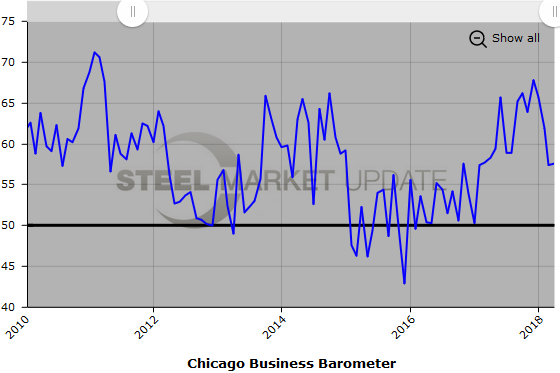Market Data

April 30, 2018
Chicago Business Barometer Inches Up in April
Written by Sandy Williams
The Chicago Business Barometer broke its three-month downward trend, inching up 0.2 points to 57.6. Production output picked up during the month, although new orders continued to decline. Both were below year-ago levels.
Supplier delivery times lengthened, and steel was mentioned by respondents as difficult to source. The index was up almost 20 percent and reflected higher material prices and the impact of recent tariffs. Input prices were near a seven-year high and prices paid jumped 22.8 percent year-over year. Inventories continued to expand, but at a softer pace. Some firms reported that uncertainty was driving prices up.
The employment indicator fell to a six-month low in April.
“While the MNI Chicago Business Barometer ended a three-month falling streak in April, supply constraints faced by firms intensified and continue to weigh on activity. Longer delivery times are proving attritive, while dearer materials bite further into margins” said Jamie Satchi, economist at MNI Indicators.
“Uncertainty among suppliers appears to be assisting the upward march in prices, but the majority of firms were optimistic any negative impact stemming directly from recently implemented tariffs would be minimal,” he added.
Below is a graph showing the history of the Chicago Business Barometer. You will need to view the graph on our website to use its interactive features; you can do so by clicking here. If you need assistance logging in to or navigating the website, please contact Brett at 706-216-2140 or Brett@SteelMarketUpdate.com.








